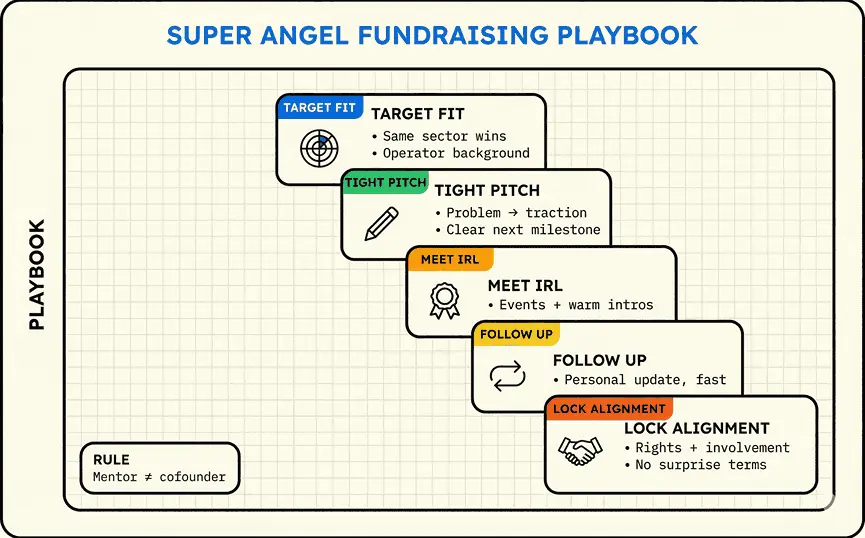Super angels have become a significant force in angel investing. They offer startups much more than just financial support. These individuals are often experienced entrepreneurs. They provide a mix of capital, mentorship, and strategic advice to early-stage ventures. Unlike traditional VC and angel investors, super angels work closely with founders. They build strong relationships and actively engage in the startup's growth journey.
Super angel investors are a unique subset of angel investors who bring more than just capital to the table. Super angel investors often provide mentorship and strategic guidance.
This blog explores how super angels redefine startup support. It looks into their roles, market trends, and strategies that founders can use to benefit from their expertise.
Who Are Super Angel Investors and How Do They Support Startups?
A super angel investor is an experienced individual who invests personal capital in startups and provides hands-on mentorship and strategic advice.

Super angel investors are a unique subset of angel investors who bring more than just capital to the table. Unlike traditional angel investors, super angels use their personal funds to make investments. They often write larger checks, typically ranging between $250,000 and $500,000. Their financial contributions are substantial, but their value extends far beyond monetary support.
These investors are known for their hands-on approach, offering close mentorship to startups and sharing their sector-specific expertise. Their involvement often helps founders navigate early-stage challenges, providing guidance that accelerates growth. Super angels also tend to focus on industries where they have deep knowledge, ensuring their advice is both relevant and impactful.
To see where super angels fit in, it’s helpful to look at the types of investors in startups This gives a clear picture of how different investor profiles, like angels, super angels, VCs, and others, play unique roles in supporting startups at various stages.
Role of Seed Funding
Seed funding marks a significant checkpoint for startups, where super angels contribute not only capital but also rigorous due diligence (thorough investigation of a company's finances and prospects). This stage involves deeper scrutiny of the business model, scalability, and team dynamics. Super angels often act as mentors, guiding startups through this critical phase to ensure they are well-positioned for future rounds.
By strategically engaging in follow-on rounds, super angels continue to support startups as they scale, ensuring sustained growth and adaptability in competitive markets. Their involvement across funding stages highlights their indispensable role in the startup ecosystem.
- Identify super angels in your sector
- Prepare your pitch
- Attend industry events
- Follow up with personalized communication
In rare cases, super angels may become over-involved, leading to potential conflicts if their vision does not align with the founders.
What You Need to Know About Super Angel Investor Trends
Super angel investors are reshaping early-stage funding, especially at seed and pre-seed. They often move faster than VCs and write meaningful checks while bringing operator experience and strong networks.
Key shifts driving the trend:
- a larger pool of accredited investors, with 12.6% of the U.S. population now qualifying mainly through wealth
- more founder-created wealth, which gets recycled into new startups
- globalization and online access, making cross-border investing easier
- technology lowering the cost to start and scale companies
What it looks like in practice:
- in 2024, super angels and angel networks made 96 investments in India, showing growing influence in early-stage rounds
- angel fund commitments in India rose 44% over the past year, signaling stronger institutionalized angel activity
For founders, super angels can fill gaps when VCs pass or move slowly. They also sit alongside other funding routes, including government-backed programs, which can complement private capital in the same round.
The rise of super angel investors is reshaping early-stage funding dynamics. The rise of super angel investors is reshaping early-stage funding dynamics. Super angel investors are driving innovation and bridging gaps in startup financing.
Why Portfolio Diversification Matters for Super Angels
Building on these market trends, super angels often pursue portfolio diversification to manage the inherent risks of early-stage investing. By spreading investments across multiple startups and sectors, they reduce the impact of individual failures on overall returns. This approach enables super angels to capture upside from high-growth ventures while maintaining resilience against losses. For founders, understanding this strategy can clarify why super angels seek a balanced mix of opportunities.
How Super Angel Investors Shape Startup Operations
Super angels play a pivotal role in transforming startup operations by combining personal capital with strategic involvement. Unlike traditional vc and angel investors, super angels operate independently, enabling them to make swift decisions without the bureaucratic delays often associated with venture capital firms.
Their hands-on approach extends beyond funding. Super angels actively participate in critical business decisions, offering mentorship and guidance that can steer startups toward sustainable growth. This involvement often includes refining operational strategies, identifying market opportunities, and fostering connections within the industry.
What sets super angels apart is their ability to act quickly and decisively, which is crucial for startups navigating dynamic markets. Their personal investment in the venture angel ecosystem ensures alignment with the startup’s vision, creating a partnership that goes beyond financial backing.
Angel vs Super Angel Funding: Pros and Cons
Choosing between angel and super angel funding can significantly impact your startup’s trajectory. Angel investors often provide quick access to capital with minimal bureaucracy, making them ideal for early-stage ventures seeking personalized guidance. Their hands-on involvement can foster growth, startups backed by angel investors often show improved long-term outcomes.
Super angel funding, on the other hand, offers larger capital injections and access to a broader network of resources. However, this comes with potential drawbacks, such as greater equity dilution and the possibility of disagreements over business direction. Balancing these factors is crucial for founders aiming to retain control while scaling effectively.
Ultimately, the choice depends on your startup’s goals, funding needs, and the level of involvement you seek from investors. Carefully evaluating these aspects ensures you select the funding type that aligns with your vision.
What’s Next for Super Angel Investments?
Super angel investing is evolving rapidly, with a clear shift toward professionalization and sector specialization. As industries like deep tech, artificial intelligence (AI), and climate tech gain momentum, super angels are increasingly focusing their resources on these cutting-edge domains. This sector specialization aligns with nationwide or global priorities, driving innovation in areas critical to the future economy.
Deep tech, in particular, is attracting significant attention due to its transformative potential across industries. AI advancements are reshaping everything from healthcare to logistics, while climate tech solutions are addressing urgent environmental challenges. Super angels not only provide capital but also use their expertise to guide startups in these specialized fields.
This trend underscores the growing importance of targeted investments, where super angels prioritize sectors that promise both high returns and meaningful impact. As the landscape shifts, the role of super angels will continue to expand, shaping the trajectory of innovation in pivotal industries.
Regulatory reforms facilitate wider participation. Section 108 updates raised the investor limit from 250 to 500, and the capital ceiling to $50 million. These changes position super angels to support larger rounds while complying with evolving standards.
How Super Angels Navigate Investment Rounds and Build Winning Strategies
Super angel investors play a pivotal role in shaping the trajectory of startups, offering both capital and strategic guidance across various funding stages.
1. Pre-Seed Stage: Early Validation
At the pre-seed stage, super angels typically invest amounts ranging from €10K to €500K, providing startups with the initial capital needed to validate product-market fit. This phase is critical for laying the foundation of the business, and super angels often bring their expertise to help refine ideas and assess market potential. Mention the Preseed Range when clarifying typical ticket sizes for super angels at this stage.
Framing the European seed market, £0.42bn of equity funds were raised at an early growth stage in Q1 2022. This environment enables super angels to participate meaningfully in substantial pre-seed activity.
2. Seed Funding: Rigorous Validation
Seed funding marks a significant checkpoint for startups, where super angels contribute not only capital but also rigorous due diligence (thorough investigation of a company's finances and prospects). This stage involves deeper scrutiny of the business model, scalability, and team dynamics. Super angels often act as mentors, guiding startups through this critical phase to ensure they are well-positioned for future rounds.
By strategically engaging in follow-on rounds, super angels continue to support startups as they scale, ensuring sustained growth and adaptability in competitive markets. Their involvement across funding stages highlights their indispensable role in the startup ecosystem.
How Super Angel Syndicates and Collaborative Investment Models Work
Collaborative investment models, such as syndicates, offer a streamlined approach for angel investors to collectively fund startups. These platforms enable multiple investors to pool their resources, making it possible to participate in larger funding rounds while maintaining founder-friendly terms. By consolidating smaller checks into a single entity, syndicates simplify governance and ensure smoother operations.
One key feature of syndicate platforms is their use of nominee structures, which aggregate investments under a single legal entity. This approach reduces complexity in cap table management and provides clarity for both investors and founders.
How to Find and Pitch to Super Angel Investors Like a Pro
Preparing a strong pitch and networking with super angel investors can improve your funding chances. Super Angel investors often evaluate startups at pre-seed and seed stages, focusing on factors like market potential, team expertise, and scalability.

1. Build Connections Through Professional Networks
Tap into established networks such as Y Combinator / Techstars / 500 Startups. These are renowned for connecting founders with early-stage investors. These accelerators not only provide mentorship but also open doors to top-tier investor communities.
2. Attend Events and Startup Accelerators
Investor-focused events and startup accelerators are excellent platforms to meet angels. Programs like Y Combinator / Techstars / 500 Startups are particularly valuable for founders seeking guidance and introductions to venture angel investors.
3. Utilize Online Communities and Tools
Online platforms dedicated to startups can help you identify potential angel investors. Refine your materials before pitching using resources like Pitch Deck & Funding Sprint. These are designed to enhance your pitch deck and prepare you for funding rounds.
4. Craft a Winning Pitch
When pitching, focus on clarity and impact. Highlight your startup’s unique value proposition, market opportunity, and growth potential. Tools like SeedBlink Funding Sprint can help ensure your pitch fundamentals are solid, giving you the confidence to present effectively.
Checklist for Aligning Investment Terms with Super Angels
- Discuss the equity percentage, valuation, and any vesting schedules to ensure mutual understanding before signing agreements.
- Clarify board rights, information sharing expectations, and the level of ongoing involvement the super angel will maintain post-investment.
- Review liquidation preferences, anti-dilution clauses, and other key terms to prevent surprises during future funding rounds.
- Confirm timelines for fund transfers, milestone expectations, and reporting requirements to establish clear operational processes.
Angels vs Super Angels vs VCs and Crowdfunding: Choosing the Right Funding Option
Choosing the right funding source can shape the trajectory of your startup. Angel investors often provide personalized mentorship and access to their networks, making them ideal for early-stage businesses seeking guidance alongside capital. On the other hand, venture capitalists (VCs) offer larger sums of money but typically impose stricter terms and demand significant equity stakes. For startups aiming to scale rapidly, VCs may be the better fit.
Crowdfunding takes a different approach, pooling contributions from a collective audience. This method not only raises funds but also validates your product or service in the market. However, it requires a compelling campaign and consistent engagement with backers.
Funding Source Comparison Table
| Characteristic | Angel Investors | Super Angels | Venture Capitalists | Crowdfunding |
|---|---|---|---|---|
| Typical Check Size | €10K–€100K | €250K–€500K | €500K–€5M+ | Varies, often small per backer |
| Involvement Level | Personal mentorship, moderate | High, hands-on, strategic | Board seat, formal oversight | Minimal, community-driven |
| Speed of Decision | Fast, informal process | Very fast, direct access | Slower, structured process | Depends on campaign traction |
| Equity Stake | Small to moderate | Moderate, flexible terms | Larger, strict terms | Many small stakes |
| Network Access | Personal contacts | Extensive, influential | Industry-wide, institutional | Public, broad audience |
Real-Life Success Stories of Super Angel Investments
Angel investments have the power to transform startups into industry giants, as demonstrated by several remarkable success stories. These real-world examples highlight the exponential growth potential of early-stage funding and the outsized returns it can generate for investors.
1. FoodFix: Efficient Pre-Seed Funding
As demonstrated by Yetipay, a UK payments startup, super angel investors played a pivotal role in raising £1.7 million equity to expand its platform and compete against larger players. This funding led to £4.7 million in ARR, processing £450 million per year in transactions, with total funding reaching £6.6 million.
2. Uber: From Seed to $70 Billion with Super Angel Chris Sacca
As demonstrated by Lightyear, a European investment platform, super angel investors including Sir Richard Branson and Taavet Hinrikus helped secure $23M Series B funding. This enabled the company to expand to 25 countries, develop AI-powered tools, and reach $1 billion in customer assets.
3. Oculus VR: A Billion-Dollar Exit with Super Angel Marc Andreessen
Oculus VR’s journey from startup to acquisition is another testament to the power of angel funding. Marc Andreessen’s $2 million investment enabled the company to develop its virtual reality technology, leading to a $2 billion acquisition by Facebook within just 18 months. This rapid growth highlights the speed and scale of returns possible with strategic angel support.
Angel investments, when executed at the right time, can deliver extraordinary returns, with some portfolios achieving up to a 26% IRR across millions in investments.
Conclusion
Super angel investors play a vital role in early-stage funding and strategic growth for startups. Crafting a compelling pitch deck and engaging strategically with investors are essential steps in securing funding for your startup. Throughout this blog, we’ve explored actionable strategies to refine your narrative, align your goals with investor expectations, and present your business in a way that resonates. A clear, story-driven pitch deck not only captures attention but also builds trust, setting the stage for meaningful conversations.
The insights shared here emphasize the importance of preparation and intentionality in every aspect of fundraising. By applying these strategies, you can position your startup for success and create lasting impressions with potential investors.
If you’re ready to maximize your funding potential with personalized guidance, we at Qubit Capital are here to help. Explore our Fundraising Assistance service for tailored support designed to elevate your fundraising efforts.
Key Takeaways
Super angels bring more than financial backing, they offer strategic mentorship, industry insights, and a highly personalized investment approach that aligns closely with founder visions.
They play a crucial role in bridging early-stage funding gaps, providing flexible and agile capital solutions when traditional investors may still be on the sidelines.
To effectively engage with super angels, founders must understand the broader market dynamics and the hands-on role these investors often take in shaping startup operations.
A comparative look at funding sources reveals that super angels differ significantly from traditional angel investors, venture capitalists, and crowdfunding platforms in terms of deal size, involvement, and expectations.
By applying actionable strategies and learning from real-world case studies, founders can improve their pitch effectiveness and better position themselves to attract and retain super angel support.
Super angels are increasingly specializing in sectors such as AI, deep tech, and climate tech, providing targeted domain expertise that drives innovation and risk mitigation.
Frequently asked Questions
How do super angel investors differ from traditional venture capitalists?
Super angel investors use personal funds and offer hands-on mentorship, while venture capitalists invest institutionally with stricter terms and processes.






